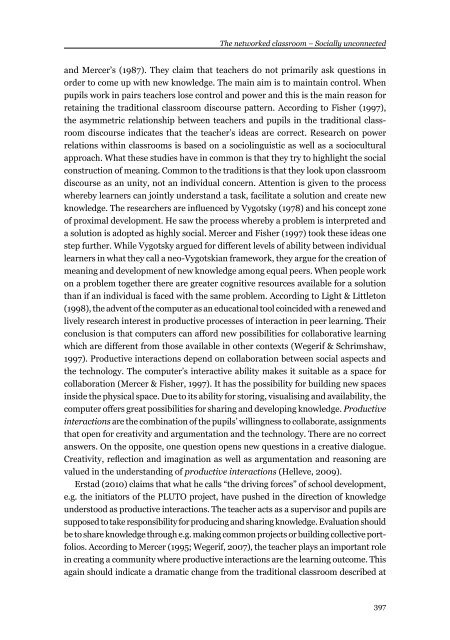Download issue - Umeå universitet
Download issue - Umeå universitet
Download issue - Umeå universitet
Create successful ePaper yourself
Turn your PDF publications into a flip-book with our unique Google optimized e-Paper software.
The networked classroom – Socially unconnected<br />
and Mercer’s (1987). They claim that teachers do not primarily ask questions in<br />
order to come up with new knowledge. The main aim is to maintain control. When<br />
pupils work in pairs teachers lose control and power and this is the main reason for<br />
retaining the traditional classroom discourse pattern. According to Fisher (1997),<br />
the asymmetric relationship between teachers and pupils in the traditional classroom<br />
discourse indicates that the teacher’s ideas are correct. Research on power<br />
relations within classrooms is based on a sociolinguistic as well as a sociocultural<br />
approach. What these studies have in common is that they try to highlight the social<br />
construction of meaning. Common to the traditions is that they look upon classroom<br />
discourse as an unity, not an individual concern. Attention is given to the process<br />
whereby learners can jointly understand a task, facilitate a solution and create new<br />
knowledge. The researchers are influenced by Vygotsky (1978) and his concept zone<br />
of proximal development. He saw the process whereby a problem is interpreted and<br />
a solution is adopted as highly social. Mercer and Fisher (1997) took these ideas one<br />
step further. While Vygotsky argued for different levels of ability between individual<br />
learners in what they call a neo-Vygotskian framework, they argue for the creation of<br />
meaning and development of new knowledge among equal peers. When people work<br />
on a problem together there are greater cognitive resources available for a solution<br />
than if an individual is faced with the same problem. According to Light & Littleton<br />
(1998), the advent of the computer as an educational tool coincided with a renewed and<br />
lively research interest in productive processes of interaction in peer learning. Their<br />
conclusion is that computers can afford new possibilities for collaborative learning<br />
which are different from those available in other contexts (Wegerif & Schrimshaw,<br />
1997). Productive interactions depend on collaboration between social aspects and<br />
the technology. The computer’s interactive ability makes it suitable as a space for<br />
collaboration (Mercer & Fisher, 1997). It has the possibility for building new spaces<br />
inside the physical space. Due to its ability for storing, visualising and availability, the<br />
computer offers great possibilities for sharing and developing knowledge. Productive<br />
interactions are the combination of the pupils’ willingness to collaborate, assignments<br />
that open for creativity and argumentation and the technology. There are no correct<br />
answers. On the opposite, one question opens new questions in a creative dialogue.<br />
Creativity, reflection and imagination as well as argumentation and reasoning are<br />
valued in the understanding of productive interactions (Helleve, 2009).<br />
Erstad (2010) claims that what he calls “the driving forces” of school development,<br />
e.g. the initiators of the PLUTO project, have pushed in the direction of knowledge<br />
understood as productive interactions. The teacher acts as a supervisor and pupils are<br />
supposed to take responsibility for producing and sharing knowledge. Evaluation should<br />
be to share knowledge through e.g. making common projects or building collective portfolios.<br />
According to Mercer (1995; Wegerif, 2007), the teacher plays an important role<br />
in creating a community where productive interactions are the learning outcome. This<br />
again should indicate a dramatic change from the traditional classroom described at<br />
397

















